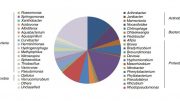On May 2, 2016, the Federal Energy Regulatory Commission (FERC) issued a favorable environmental assessment for the Atlantic Bridge natural gas pipeline project, proposed by Algonquin Gas Transmission and Maritimes & Northeast Pipeline (both subsidiaries of Spectra Energy, a large pipeline and midstream company), to expand existing pipeline systems and enhance natural gas transportation service to the New England states and the Maritime provinces of Canada.
The Atlantic Bridge Project would provide additional firm pipeline capacity required to meet Northeast market growth and has preexisting agreements to account for its entire capacity. The project could eliminate capacity constraints in the Northeast region, where critically constrained pipeline infrastructure – particularly in winter months – has resulted in higher electricity prices and reliability challenges.
[…]
Currently, power producers lack incentive to procure year-round capacity, as the wholesale electricity market structure —which bases clearing prices on the lowest marginal costs – does not provide generators with an effective means to recover the costs incurred to ensure reliability through firm pipeline transportation.
[…]
Electric market design changes providing ways to recover the cost of firm pipeline capacity – where needed for electric reliability – would support existing and incentivize additional pipeline infrastructure necessary to alleviate constraints.
[…]
Algonquin’s proposal would permit electric distribution companies (EDCs) to prearrange releases of firm gas transportation capacity to generators serving the regional power grid as part of a state-regulated program. Algonquin said that the proposal would further FERC’s gas-electric coordination efforts and support efforts by EDCs to increase supply reliability for gas-fired electric generation and address high electricity prices during peak periods.
[…]
The Atlantic Bridge Project would give a tangible push to south-to-north flow on the Maritime system and bodes well for Marcellus drillers and liquefied natural gas (LNG) export facilities. Although there are several proposals to export LNG from the U.S. and Canada, FERC notes that the Atlantic Bridge project differs by having industrial and commercial natural gas users within Canada, rather than LNG export companies, as potential customers.
[…]
Citing inadequate incentive for market commitments, on February 16, Algonquin proposed tariff revisions (Docket No. RP16-618-000) that would facilitate the release of firm capacity acquired by EDCs through state-regulated electric reliability programs for use by electric generators, thereby supporting electricity generation for grid delivery and ratepayer benefits. The proposal seeks to exempt EDCs participating in state-regulated electric reliability programs from the capacity release bidding requirements when they directly or indirectly release capacity to electric generators. It would permit EDCs to prearrange releases of firm gas transportation capacity to generators serving the regional power grid as part of a state-regulated program.
[…]
While some commenters have supported the concept, several others have sought clarity on the scope and applicability of the proposal.
[…]
Other opposing commenters have argued that:
- Exemption from FERC capacity release policies should be implemented through rulemaking procedures rather than an individual pipeline tariff proceeding;
- The proposal is premature and should not be considered until a state-regulated electric reliability program has been approved by Massachusetts or other New England states, or until Algonquin can provide additional details;
- The proposal would result in undue discrimination for Algonquin connected gas-fired electric generators which would benefit of purchasing non-biddable, subsidized capacity from EDCs through their asset manager and generators connected to other pipelines;
- The proposal does not justify a bidding exemption for capacity releases compared to state-sponsored natural gas retail access programs;
- The arrangement would provide certain shippers with preferential treatment despite the willingness of other shippers to pay more than
the price obtained for the preferentially released, non-biddable capacity.
In addition, EDCs drew on FERC authority to find that the public interest supports the proposal given the existing provision of exempting state natural gas retail access programs and asset manager arrangements from capacity release bidding requirements. The outcome of the conference may have
significant impact on similar infrastructure projects in the future, especially if it leads to sufficient incentives for gas-fired generators to lock up firm capacity.
[…]
The electric generation market currently presents a significant growth opportunity for natural gas, and the interdependence of electric-gas markets will likely accelerate as renewable energy resources require natural gas plants for backup and as low natural gas prices encourage increased gas
consumption.
[…]
Long-term firm subscriptions, which account for capacity on proposed projects, are critical to advance pipeline projects as they provide revenue certainty for infrastructure investments. Inadequate firm commitments are seen as a barrier for new pipeline development as the electric generation market has not traditionally favored long-term firm pipeline commitments.
[…]
The recent suspension of Kinder Morgan’s AED and Algonquin’s proposal to facilitate electric utility purchase of pipeline capacity demonstrate the need for regulatory solutions to facilitate binding EDC commitments.
The full version of the original article available at enerknol.com






Be the first to comment on "Impact of New Pipeline Infrastructure Tied to Firm Capacity Contract Debates"